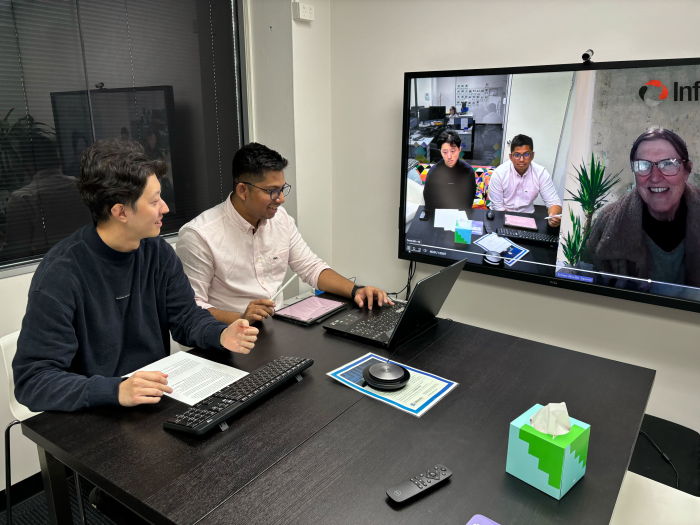Adelaide University Internship Experience and Industry Project - Mostafa Didar Mahdi
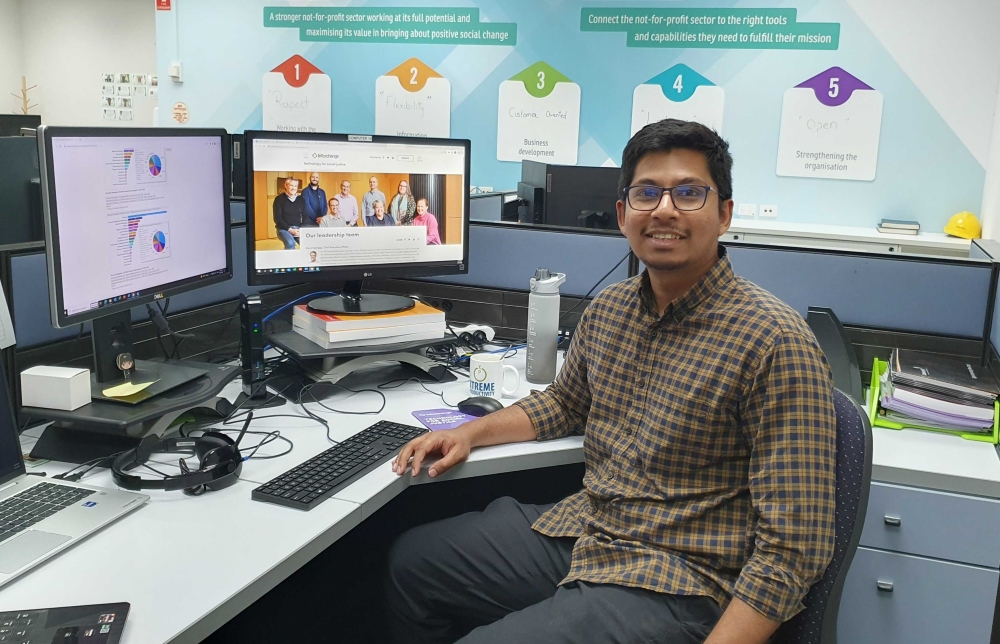
Welcome Mostafa!
Mostafa Didar Mahdi joined our SAcommunity Data Analytics Team for his University of Adelaide SET (Sciences, Engineering and Technology) Internship for his Master of Artificial Intelligence and Machine Learning Trimester 1 & 2, 2024: 23 January 2024 - 22 July 2024. He completed a 280 hour internship onsite with SAcommunity at the Connecting Up Office, Infoxchange for 3 days (22.5 hours) a week for ~14 weeks around his classes and remotely offsite for the second half of his Internship and Industry Project.
Mostafa also undertook his Industry Project at Connecting Up, looking at using AI and Machine Learning to improve the open SAcommunity directory field: 'Venue Availability' which includes details on community public spaces, such as meeting rooms, community centres and facilities available to the public and completed 106 towards this project.
These community spaces and places allow for social activities, interaction, and support, fostering wellbeing and resilience. Mostafa's project will enhance the information architecture within this open field into a series of defined closed fields, improving search and access for people looking for public venues.
Mostafa presented his paper 'Advancing Community Directories: Leveraging LLMs for automated extraction in MARC standard venue availability notes' under Advances in NLP Models and Techniques at the 22nd Annual Workshop of the Australasian Language Technology Association (ALTA 2024) held at the Australian National University (ANU), Canberra, 2nd - 4th December 2024. A copy of the pdf is >>here
A recording of his presentation can be found >>here.
Mostafa returned to the SAcommunity program as a volunteer to look into the SAcommunity Website Rebuild Project. We are very pleased to report that Mostafa has found work as a Junior Data Scientist at Complexica starting 12 March 2025 - Congratulations Mostafa!!! Thank you for visiting us at the office to share your good news!
Industry Project: 106 hours
Internship: 280
Volunteering: 36
Total Hours 428 This Year 12 Joined 24 January 2024 Last Check-in 11 March 2025 (Retired, Transitioned to Work)
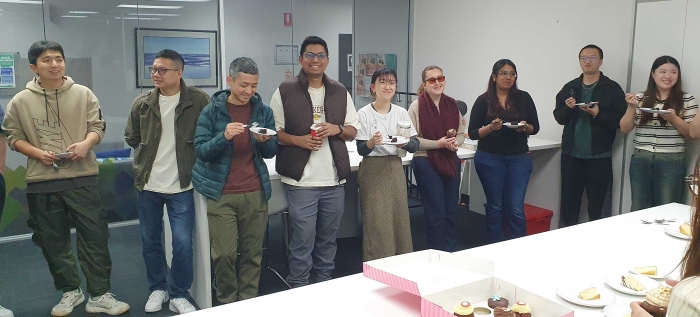 Mostafa returned to volunteer and is here on RUOK Day 10 September 2024
Mostafa returned to volunteer and is here on RUOK Day 10 September 2024
Personal Biography
Mostafa is currently completing a Master's degree in Artificial Intelligence and Machine Learning at the University of Adelaide, following his undergraduate degree in Computer Science and Engineering from North South University, Bangladesh. Mostafa has worked as a research assistant in the fields of deep learning, and geospatial data mining. He has published and presented two papers in the Institute of Electrical and Electronics Engineers (IEEE) conferences held in Indonesia and the USA. He has also worked as a verified reviewer for the IEEE journal 'IEEE Geoscience and Remote Sensing Letters'.
His current research interests include applied natural language processing, computer vision, and causal analysis, involving extracting crucial information from images, texts and videos and deriving insightful features that contribute to and improve overall decision making. He wants to gain more real-world experience in the world of data and expand his network, which is why he joined Connecting Up as an intern in the Data Analytics Team.
Mostafa's future plan is to use AI for social good, adhering to AI ethics and transparency. He plans to be actively involved in the AI ecosystem in Australia and help build a data driven future applied to the government or industry.
Research Papers
'A Deep Gaussian process for forecasting crop yield and Time-Series analysis of precipitation based in Munshiganj, Bangladesh' IEEE International Geoscience and Remote Sensing Symposium, Supervisor and Co-Author: Dr. Shahnewaz Siddique, Assistant Professor, North South University <https://ieeexplore.ieee.org/document/9323423>
'EZ Parking: Smart Parking Space Reservation Using Internet of Things' International Conference on Advanced Computer Science and Information Systems, Supervisor and Co-Author: Tamanna Motahar, Ph.D in Computer Science (Ongoing), University of Utah, USA, <https://ieeexplore.ieee.org/document/8618232>
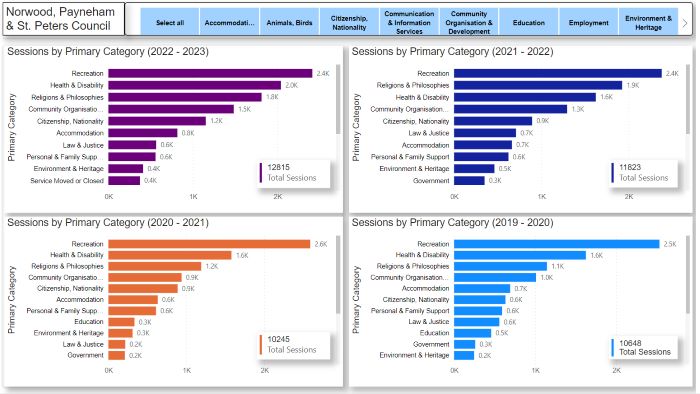 Dashboard created independently by Mostafa comparing preceding 4 years for his council
Dashboard created independently by Mostafa comparing preceding 4 years for his council
Community Services in Councils Project
Mostafa has selected Norwood, Payneham & St Peters for his Power BI council reports, a database of approximately 326 community services operating in the area for the financial years 2021-2022 and 2022-2023. His reports follow previous data reports work by Stathis Avramis, and can be found >>here.
The process of creating community service information data presentations involves several steps. Data trends are summarized by utilizing information from Google Analytics and SAcommunity. Subsequently, Power BI and Canva reports are generated, which may reveal data anomalies and the need for corrections. The database is then updated with improved information, and the reports are recreated. The final data reports are published on the website and were introduced by Mostafa to council stakeholders for their information and feedback.
On March 13, 2024, Mostafa reached out to the Norwood, Payneham and St. Peters council via email and phone calls. His objective was to raise awareness about the SAcommunity service among potential stakeholders, specifically council staff involved in community consultation or community development areas. He presented his publicly available data reports, which can serve as an additional tool for understanding the community's needs in the area.
Additionally, Mostafa independently created a dashboard summarizing the community service information for Norwood, Payneham and St. Peters over the preceding four years (shown above). This comprehensive dashboard allows for comparison and analysis of the data over the previous four years. His in-depth data driven insights on User Engagement and Behavioral Analysis report for the council can be found here, where he dives deeper into the meaning behind the data and highlights key considerations that would help the council with their decision making.
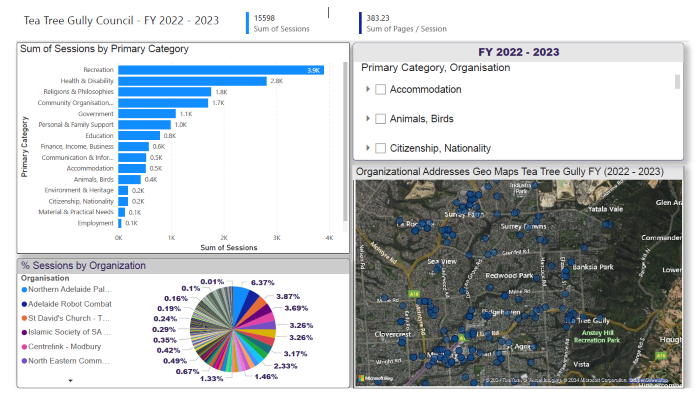
Mostafa has also worked with the Tea Tree Gully Council (City of Tea Tree Gully) and created PowerBI reports for the FY 2022 - 2023. He created a unique dashboard geotagging the organizations within the councils so that it's easier for users to look up and explore the addresses on a map. Additionally Mostafa created a Geo-Map showcasing visitors from every parts of the world who are interested in the council. His interactive reports can be found here.
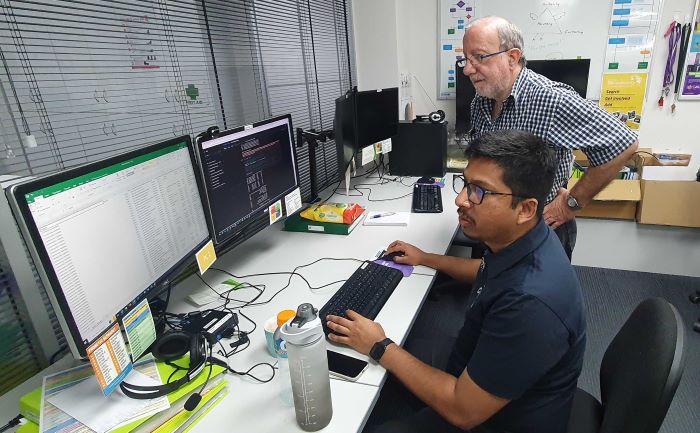 Mostafa solving a data problem with Stathis Avramis who currently leads the Data Analytics Team
Mostafa solving a data problem with Stathis Avramis who currently leads the Data Analytics Team
Capacity Building:
Mostafa created a work-around solution adressing some of PowerBI's limitations to effectively download, edit and manage reports. He used the PowerBI REST APIs to transfer reports from the PowerBI service to PowerBI desktop ensuring no data loss, saving time and resources and proving his skills in tackling complex data management problems. His step by step detailed tutorial can be found here and a more detailed tutorial on his medium here.
Mostafa also helped us with overcoming the data export limitations of Google Analytics by incorporating Google's Looker Studio previously known as Google Data Studio into the pipeline. Looker Studio (a free tool) seamlessly integrates with Google Analytics, allowing users to pull data directly into customizable reports and dashboards. This integration greatly simplifies the process of data extraction and manipulation compared to Google Analytics, which only allows exporting a limited number of rows at a time (e.g., 5,000 rows). This can be restrictive for larger datasets. Knowing how big the SAcommunity database is, Mostafa helped everyone by educating them about Looker Studio and it's benefits.
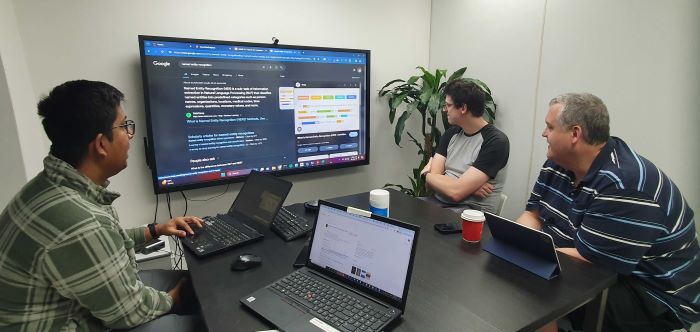 Mostafa Didar discussing his Industry Project with Cameron Brown - Web Developer (left) and James Newport - Senior Web Developer (right) at Connecting Up
Mostafa Didar discussing his Industry Project with Cameron Brown - Web Developer (left) and James Newport - Senior Web Developer (right) at Connecting Up
AI & Machine Learning Industry Project:
Mostafa is working on an AI & machine learning industry project at the University of Adelaide, utilizing the SAcommunity open data community information database containing approximately 14,500 records. The project aims to enhance the efficiency and utility of digital information management, particularly in the context of event management. Mostafa is leveraging state-of-the-art deep learning models to automate the extraction of structured data from unstructured text summaries. The primary focus is on transforming free-text descriptions of community service information into structured, MARC standard-compliant data elements, specifically targeting details related to meeting rooms and facilities, referred to as "venue availability." By integrating transformer-based models, the project seeks to elevate its capabilities, ensuring robust and context-aware extraction of information, ultimately streamlining the process of managing community directories and event-related data. His extracted entities can be found here: (Internal Link for SAcommunity Members)
Project Overview:
Developed an automated system to extract and structure venue availability information from community service directories using advanced Natural Language Processing (NLP) techniques. The system transforms unstructured text descriptions into standardized MARC (Machine-Readable Cataloging) format, improving accessibility and searchability of community venue information.
Technical Implementation:
- Leveraged RoBERTa transformer model with custom Named Entity Recognition (NER) training
- Implemented active learning to efficiently improve model performance with limited labeled data
- Integrated IOB tagging for precise entity identification
- Used Doccano for data annotation and Weights & Biases for experiment tracking
Key Features:
- Automated extraction of venue details including:
- Facility names and locations
- Room capacities
- Available equipment
- Accessibility features
- Rental fees
- Usage restrictions
Impact on SAcommunity
- Transformed SAcommunity's venue information management, serving South Australia since 1981
- Processed over 14,000 community service entries in the database
- Automated the extraction of venue information from free-text descriptions, reducing manual processing time by an estimated 70%
- Enhanced the accessibility of venue information for South Australian residents
- Supported the Government of South Australia's initiative for improved community service access
- Enabled more efficient updates to the community directory, ensuring information stays current
- Improved search functionality for users looking for venue hire options
- Standardized data format allowing easier integration with other government and community services
Technologies Used
- Python
- RoBERTa (Transformers)
- Doccano (Annotation Tool)
- Weights & Biases (Experiment Tracking)
- spaCy (NLP Processing)
- MARC Standards
Outcome
Created a scalable solution that transforms unstructured venue descriptions into structured, standardized data, making community resources more accessible while reducing administrative overhead. The system demonstrates the practical application of advanced NLP techniques in solving real-world information management challenges.
Industry Collaboration
Developed in partnership with University of Adelaide, demonstrating successful academia-industry collaboration in creating practical solutions for community benefit. The project directly addresses the high demand for venue hire information, as indicated by significant search traffic in Google Analytics.
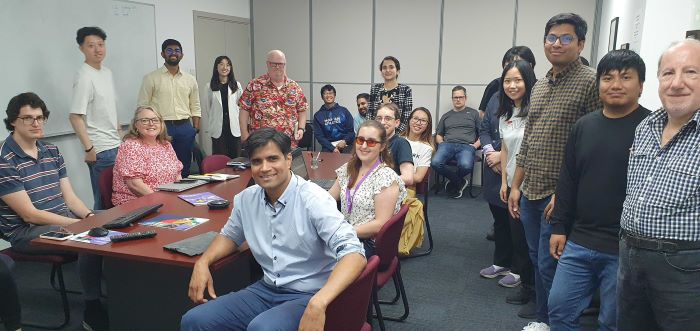
Work experience - Internal/External Connections & Networks - Meetings, Training and Events:
Volunteers and interns are encouraged to attend monthly SAcommunity Team meetings, Connecting Up staff meetings, as well as quarterly all-staff Infoxchange Town Hall meetings to understand more about the organisation as a whole.
Relevant meetings Mostafa has attended include:
13 February 2024
Introduction to Jo Davies the COO of Infoxchange
I recently had the chance to meet Jo Davies, the new Chief Operating Officer at Infoxchange. It was incredibly interesting to hear about her journey, where she has led teams of various sizes through the complexities of designing, developing, and managing innovative technology solutions. One of the most compelling aspects of our conversation was Jo’s deep passion for using technology and data to create positive change within the sector.
Jo's strong commitment to putting customers first really stood out. She stressed the importance of ensuring that our technological solutions are perfectly aligned with the needs and expectations of our clients. This approach not only enriches the services we offer but also ensures that we're fully leveraging technology to benefit those we serve.
Moreover, Jo's focus on the employee experience was clearly visible as she talked about building a workplace culture that supports talent development and innovation. The time spent with Jo was truly enlightening, offering a glimpse into the thoughtful leadership at Infoxchange. Her extensive knowledge and authentic enthusiasm for harnessing the power of technology and data were not only impressive but also quite inspiring.
12 March 2024 & 9 April 2024
Updates from the Connecting Up Team includes monthly highlights, plans, activities
Infoxchange All Staff Town Hall Meeting 27 February 2024
Updates from the Infoxchange CEO, Operations, Finance, People & Culture, Lightning Talks from IX Teams, and IXcel Awards
 Lunch and Learn
Lunch and LearnLunch & Learn: Effective Meeting & Communication Skills
In summary, my key takeaway was the vital role that surplus management plays in ensuring the sustainability and impact of not-for-profit organizations, challenging the traditional perspective that generating surplus conflicts with charitable purposes. This knowledge enhanced my understanding of financial strategies that align with the values and goals of not-for-profit entities.
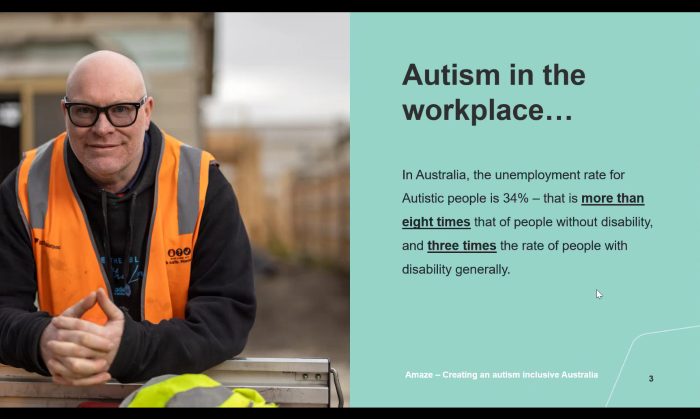
World Autism Month Talk 5 April 2024
I attended the "Lunch and Learn" session focused on autism, led by Jim Mullan, CEO at Amaze, as part of World Autism Month on Friday April 5th, 2024. During the session, I learned about the challenges faced by autistic individuals, including employment difficulties and societal misconceptions. Jim Mullan discussed the evolution of societal understanding of autism, moving away from outdated stereotypes to recognizing the unique abilities and needs of autistic people.
I also gained insights into the initiatives aimed at improving inclusivity and support for the autistic community. This includes the development of programs that assist autistic individuals with faster and more affordable access to diagnosis and support services. Furthermore, the session highlighted the importance of creating employment opportunities for autistic individuals and the benefits of workplace diversity and inclusion.
In summary, my learning from the session emphasized the ongoing efforts to enhance societal and workplace inclusion for autistic individuals, the challenges that remain, and the strategies being implemented to address these challenges. This knowledge enhanced my understanding of autism and the importance of advocacy and supportive policies.
Stakeholder Events:
The Data Catalyst Network is made up of close to 50 organisations working with data from the not-for-profit community sector. Interns were invited to a presentation hosted by Infoxchange with other members of the network including 54 Reasons, Mission Australia, The Smith Family, Relationships Australia South Australia, Raising Literacy Australia, the South Australian Government, Social Ventures Australia, the University of Melbourne and more.
Augmented Intelligence: Combining Organisation Data with Large Language Models 29 February 2024
presented by Dr. Amir Aryani, Associate Professor at the Swinburne University of Technology, on February 29, 2024, delved into the innovative integration of large language models (LLMs) with organizational workflows and data. It delved into the concept of Augmented Retrieval Generative (RAG) intelligence, detailing how external knowledge bases can enrich LLMs for more accurate and context-relevant outputs. The webinar explored the practical applications and ethical considerations of deploying LLMs in business environments, highlighting the balance between leveraging AI's power for operational efficiency and maintaining data privacy, security, and ethical use. This discussion was critical for understanding how organizations can responsibly harness AI technologies to improve operations while adhering to ethical standards.
Aboriginal Data Sovreignty 20 March 2024
Mostafa attended the The Data Catalyst Network Webinar, "Aboriginal Data Sovreignty”conducted by Jim O'Shea, COO & Company Secretary at VACCHO on 20th March 2024. He learned about the inherent right of Aboriginal and Torres Strait Islander peoples to govern the collection, ownership, and application of data about themselves and their communities, rooted in the United Nations Declaration on the Rights of Indigenous Peoples (UNDRIP). The webinar highlighted several guiding principles like the CARE Principles and First Nations Information Governance Centre Principles, as well as growing efforts across different jurisdictions to develop supporting frameworks. "However, I also gained insight into the frustrations of Aboriginal individuals and communities regarding lack of access, control and consent over data collected about them, underscoring the need for greater transparency, data-sharing agreements and co-governance models." Aboriginal Community Controlled Organizations are taking steps towards data sovereignty by developing their own data repositories. Overall, this webinar provided a valuable perspective on the critical importance of recognizing Aboriginal Data Sovereignty as a means of empowerment, self-determination and aligning data practices with the priorities and values of Aboriginal communities.
The Benevolent Society & Microsoft talk about Fabric 24 April 2024
This Data Catalyst Network webinar conducted by Marcello Sequeira, Head of Data Governance, Analytics and Architecture at The Benevolent Society and Benny Austin, Cloud Solution Architect at Microsoft provided a comprehensive insight into the advancements and integrations in data management, particularly through the use of Microsoft Fabric. I learned about the critical challenges and opportunities that modern data platforms address, focusing on data accessibility, security, and the integration of AI to enhance data utilization.
The webinar highlighted the need for an integrated data environment where various tools from different vendors can work seamlessly together. This is vital for improving data governance, reducing complexity, and enabling more effective data-driven decisions. The concept of a unified data platform, as discussed, simplifies the management and accessibility of data across different teams within an organization, eliminating data silos and enhancing collaboration. Furthermore, the integration of AI and machine learning capabilities into these platforms was a key takeaway. These technologies not only automate mundane tasks but also enable more sophisticated data analysis and insights, which are crucial for the effective deployment of resources and improving operational efficiencies.
Overall, attending this webinar deepened my understanding of the state-of-the-art in data management technologies and their practical implications for organizations striving to leverage data as a strategic asset.
Getting your data in shape: Data Governance and AI May 2024
From the "Getting Your Data in Shape" webinar hosted by the Data Catalyst Network, I gleaned valuable insights into the management and governance of data within organizations, a crucial area for any data-driven environment. The session, led by Kristen Moeller-Saxone and Andrew Fisher, covered a range of topics that are particularly relevant to my ongoing projects and professional interests.
Kristen introduced upcoming initiatives aimed at organizations with lower data capabilities, which is particularly useful as it aligns with my interest in making data science accessible across different skill levels. Her discussion on the practical actions surrounding Aboriginal data sovereignty provided a policy perspective and underlined the importance of understanding rights and obligations in data management—key considerations for ensuring ethical data practices.
Andrew Fisher's talk was especially pertinent to my work. He discussed "dark system discovery," a process essential for identifying undocumented systems where organizational data might inadvertently reside. This process is crucial for data loss prevention and introduces a layer of control that prevents data from ending up in unapproved systems or being exfiltrated, thereby enhancing cybersecurity measures.
His examples highlighted common issues such as data silos within organizations and the misuse of systems like CRMs and ERPs by employees opting for simpler, albeit riskier, alternatives like spreadsheets. This part of the session resonated with me as it reflects challenges I've observed in various data environments, emphasizing the need for comprehensive governance and continuous education on data handling practices.
Overall, the webinar equipped me with a deeper understanding of data governance strategies and the complexities of data management in modern organizations. These insights will undoubtedly aid in refining my approach to data projects, ensuring not only technical efficiency but also adherence to best practices in data ethics and security.
Mentor Meeting 26 April 2024
Connecting Up Volunteers and Interns are provided with the opportunity to select staff members from across the wider Infoxchange organisation for an informational mentor meeting. Here they have the opportunity to ask more about staff members job roles and employment journey, and learn about their career and professional development, to gain insights and guidance that can be applied towards their own success.
Reflecting on the mentor meeting with Dr. Kristen Moeller-Saxone, I gained a deeper appreciation for the challenges and opportunities presented by data-driven roles, especially within the not-for-profit sector. Dr. Moeller-Saxone's insights into data strategy and her emphasis on the ethical considerations of data use in vulnerable populations were particularly enlightening. Her experience reinforced the importance of building networks and connecting with like-minded professionals who can share knowledge and opportunities.
One key takeaway was the potential for data science to make significant impacts beyond the commercial sector, especially in social good initiatives where technology can greatly improve outcomes for disadvantaged groups. Dr. Moeller-Saxone's discussion about predictive analytics in not-for-profit organizations opened up avenues on how I might leverage my skills to predict and improve outcomes for such communities.
Another important lesson was the value of soft skills and creativity in data science roles. The ability to communicate complex ideas simply and effectively can set one apart in the field and is crucial when working with non-technical stakeholders.
Lastly, Dr. Moeller-Saxone highlighted the dynamic nature of data-related careers and the importance of staying adaptable and continually learning. She encouraged participation in projects even outside one's direct field of study to gain diverse experiences, which resonated with me as I look to expand my own career horizons.
Overall, the meeting was not only a great learning opportunity but also an inspiration to pursue AI not just as a career but as a tool for real-world impact.
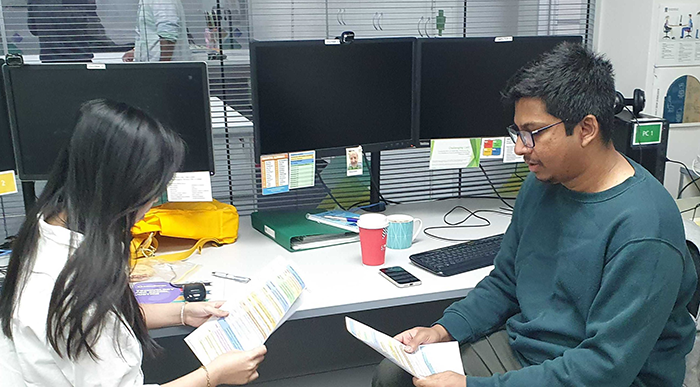 Mostafa and Kristen practicing telephone techniques.
Mostafa and Kristen practicing telephone techniques.At Connecting Up, opportunities are created where volunteers and interns undertake sessions in-house to learn a universal telephone script, and practice introducing themselves, their services, and to gather information. Firstly through demonstrations with our Customer Service Team Lead, David Webb, and secondly in practice workshops with our long-standing volunteers and also with their peers. When students are ready, they can begin to contact community services where data is older or anomalous, ahead of contacting council stakeholders to introduce data reports to stakeholders.
Digital Training & Development
Volunteers and interns have access to the Connecting Up Digital Learning Platform providing live webinars and recorded webinars, workshops and webcons presented by subject-matter experts to understand more about a range of technology topics for the not-for-profit sector.
Relevant training sessions were selected, attended, summarised and assessed by Mostafa to look at how these sessions can enhance his internship experience have included:

Webinar 1: AI 101: Empowering NFPs for the Digital Era
The webinar, held on 20th February 2024 and led by Kate VanderVoort from SocialMediology, provided a detailed overview of how artificial intelligence can be leveraged by nonprofit organizations. Through the webinar, I gained insights into different types of AI, and practical applications of AI in organizational settings, such as enhancing content creation, improving volunteer management, and optimizing donor personalization. Key takeaways included the importance of understanding AI capabilities and limitations, effectively using prompt engineering for better AI outputs, and the potential of AI to not only streamline operations but also to enrich engagement with stakeholders. This session highlighted AI's transformative potential in the nonprofit sector, emphasizing strategic integration for efficiency, innovation, and greater impact.
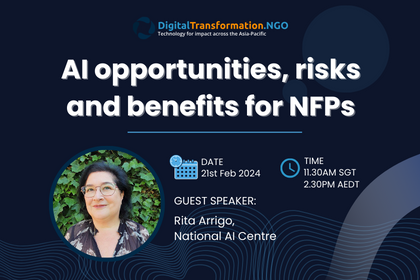
Webinar 2: AI Opportunities, Risks, and Benefits for NFPs
The webinar, presented by Rita Arrigo at the National AI Centre at CSIRO in February 2024, delved into the transformative power of AI for not-for-profit organizations. The session highlighted the expansive role of generative AI in content creation, the utilization of AI algorithms for operational efficiency, and the enhancement of accessibility through technology. It stressed the importance of responsible AI adoption, focusing on ethical considerations, and the potential of AI to drive significant impact in various domains such as conservation and healthcare. The webinar highlighted the need for skill development and organizational readiness to harness the full potential of AI technologies.
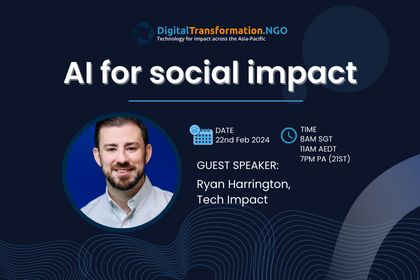
Webinar 3: AI for Social Impact
The "AI for Social Impact: AI Ethics for Nonprofits" webinar, presented on February 21, 2024, by Ryan Harrington of the Data Innovation Lab at Tech Impact, focused on navigating the ethical landscape of AI utilization in the nonprofit sector. It emphasized understanding AI's potential risks and benefits, addressing biases, ensuring algorithmic accountability, and prioritizing transparency and fairness. The session encouraged nonprofits to critically evaluate AI technologies' impact on society, individuals, and the environment, and to implement AI solutions responsibly, aligning with ethical principles and human rights. This insightful discussion highlighted the importance of ethical considerations in leveraging AI to advance nonprofit missions.
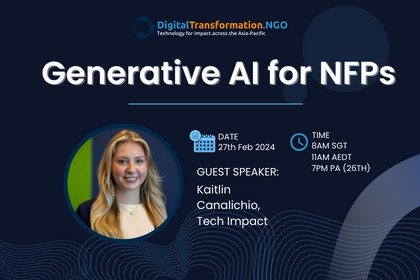
Webinar 4: Generative AI for NFPs – Digital Transformation
This webinar, hosted on February 27, 2024, by Kaitlin Canalichio from Tech Impact's Data Innovation Lab, provided a deep dive into how generative AI technologies can empower nonprofits. The session covered AI's basic principles, ethical considerations, practical use cases for nonprofits, and the art of prompt engineering for optimizing AI outputs. It aimed at enhancing organizational capabilities in fundraising, communications, accessibility, risk detection, content personalization, and event planning through AI. This insightful presentation underscored the balance between embracing AI advancements and adhering to ethical standards for social good.
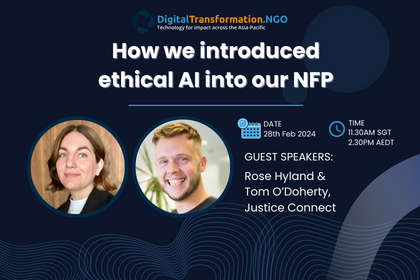
Webinar 5: How we introduced Ethical AI into our NFP
This webinar led by Rose Hyland, Innovation Project Lead at Justice Connect and Tom 0’ Doherty Head of Innovation at Justice connect focused on a practical example of how they developed and implemented AI into their organization, aimed at enhancing legal service delivery to those in need. By integrating AI technologies, Justice Connect successfully streamlined the process of matching individuals with appropriate legal services, thereby improving accessibility and efficiency. The project involved a collaborative effort with stakeholders across various sectors, ensuring a multidisciplinary approach to development and implementation. A strong emphasis was placed on the ethical use of AI, particularly in handling sensitive information, showcasing a model for responsible AI deployment in service-oriented contexts. The webinar highlighted the importance of data protection, ethical use of data, conducting regular security audits and testing to identify and address vulnerabilities, staying compliant with relevant regulations and standards governing data privacy and security and conducting regular health checks during the whole implementation lifecycle.
Getting your data in shape: data governance and AI - 19 June 2024
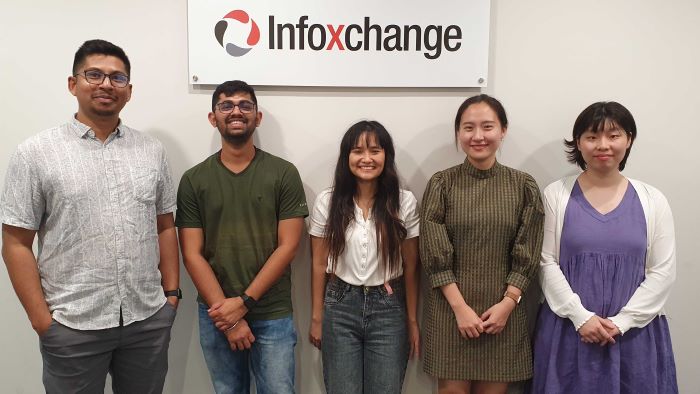 Mostafa with interns Harsh, Olivia, Sylvia & Violet.
Mostafa with interns Harsh, Olivia, Sylvia & Violet.
Internship Summary: My Experience at SAcommunity Data Analytics Team
I completed my University of Adelaide SET (Sciences, Engineering, and Technology) Internship as part of my Master of Artificial Intelligence and Machine Learning during Trimester 1 & 2, 2024, from January 23 to 23 July. Over these four months, I worked a total of 280 hours, dedicating three days a week at the Connecting Up Office, Infoxchange, which was integrated seamlessly around my class schedule.
During my internship, I embarked on an important industry project to enhance the SAcommunity directory's 'Venue Availability' field. This part of the directory, which lists public spaces like meeting rooms and community centers, is vital for community engagement. My goal was to improve the structure of this information, transforming it from an open field to a series of defined closed fields, thereby improving both search functionality and accessibility.
Alongside my project, I also contributed to creating a detailed Power BI council report for Norwood, Payneham & St Peters, documenting the community services available for the financial years 2021-2022 and 2022-2023 and Tea Tree Gully Council for years 2022 - 2023. Additionally, I addressed technical challenges within our data processes; for example, I developed solutions to overcome PowerBI's limitations and enhanced the data export processes from Google Analytics using Looker Studio as well as create a workaround solution for addressing PowerBI service limitations in terms of data handling & management.
Throughout my internship, I took advantage of multiple learning and networking opportunities offered at Infoxchange. I participated in monthly staff meetings, attended various Lunch and Learn sessions, and engaged in webinars focused on the practical applications of AI in the nonprofit sector. These experiences not only broadened my professional knowledge but also expanded my professional network and deepened my understanding of how AI and data analytics can drive social good within community-focused organizations.
This internship allowed me to apply my technical skills in meaningful projects and contributed significantly to my professional development. I am committed to leveraging AI for social good, adhering to ethical standards, and I appreciate how this experience has prepared me to contribute effectively to the data-driven future of the government or industry sectors.
 Interns and volunteers with Pankaj Chhalotre, Head of Connecting Up.
Interns and volunteers with Pankaj Chhalotre, Head of Connecting Up.
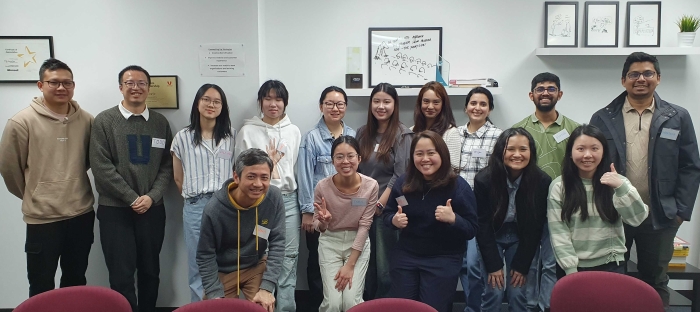 13 August 2024 Mostafa joined new volunteers and interns on their induction day
13 August 2024 Mostafa joined new volunteers and interns on their induction day
Sign up for the newsletter!
Subscribe to our monthly newsletter to receive news, information and events for the community sector in SA.




